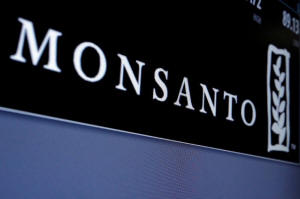|
Monsanto's vice president of global biotechnology, Tom Adams,
will leave the seed giant to become chief executive of the new
firm, called Pairwise Plants, the companies told Reuters. He
steps into the new role on April 1.
The collaboration accelerates a race among agricultural
scientists and companies worldwide to develop new seeds for
crops using gene editing, a process they say can produce non-GMO
farm products that do not contain foreign DNA from a different
species.
Unlike traditional GMOs, in which a gene is added from another
organism, gene-editing works like the find-and-replace function
on a word processor. It finds a gene and then makes changes by
amending or deleting it.
Using "molecular scissors" to cut DNA means scientists can edit
genomes more precisely and rapidly than ever before, and altered
agricultural products could get to market more quickly and
cheaply.
Monsanto, famous for engineering soybeans to resist the weed
killer Roundup, will pay Pairwise $100 million over the next
five years to finance research on gene editing tools, Adams said
in an interview.
Pairwise will also research how to use the tools to alter
commodity crops, including corn, soy, wheat, cotton and canola,
exclusively for Monsanto, according to the companies. The deal
allows Monsanto, which is being acquired by Bayer AG, to
commercialize products from the partnership.
"The collaboration really will help accelerate the development
of the technology," said Robb Fraley, Monsanto's chief
technology officer.
Separately, Monsanto's venture capital arm, along with
investment firm Deerfield Management, each committed $12.5
million to form Pairwise as part of a Series A financing round,
according to Pairwise.
Among Pairwise's founders is David Liu, a Harvard University
professor who pioneered a new form of gene editing that the
company said allows scientists to make more precise changes to
plant genomes.
Pairwise aims to hire up to 100 people in its first two years,
said Haven Baker, who will be chief business officer. Baker
formerly worked for McDonald's Corp potato supplier J.R. Simplot
Company on the development of a biotech potato.
Beyond commodity crops, Pairwise intends to use gene editing for
research on other plants, possibly including fruit.
"We want to make food crops more convenient, affordable and
sustainable," Baker said.
(Reporting by Tom Polansek; Editing by Cynthia Osterman)
[© 2018 Thomson Reuters. All rights
reserved.] Copyright 2018 Reuters. All rights reserved. This material may not be published,
broadcast, rewritten or redistributed.
Thompson Reuters is solely responsible for this content.

|
|







